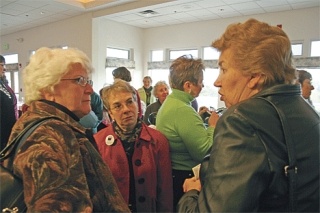The senior senator in the Washington State Legislature delivered gloomy news Saturday to a room packed with about 50 civic-minded women and three men.
The League of Women Voters of Whidbey Island held their annual legislative brunch at the Whidbey Golf and Country Club, but only Democratic Sen. Mary Margaret (D-Camano Island) showed up to speak about the tough times and difficult issues.
Rep. Norma Smith, (R-Clinton), was sick and Rep. Barbary Bailey (R-Oak Harbor) didn’t have time in her schedule. She’s only attended the brunch once in her years in office, according to the league.
Not surprisingly, the budget and the ferries dominated the talk. Haugen, the chair of the Senate Transportation Committee, said the budget is bleak and that programs that are “near and dear” to her will have to be cut.
“If we were to cut the entire higher education and corrections budget, we still wouldn’t have enough to fill the budget gap,” she said. “That’s how dire it is.”
Haugen said she’s hopeful that the president-elect’s stimulus package, if passed, will help the economy. In the state, she predicts most of the federal money for infrastructure projects will go toward maintenance-type projects.
“We’ve really neglected our infrastructure,” she said.
If the state doles out the federal money, she promised to work to ensure that it doesn’t all end up in King County.
“We should assess where the highest rate of unemployment is so we can send the money there,” she said.
The recession comes at an especially bad time for the state’s aging ferry system, which is between a rock and a hard place.
“Ferries probably take the smallest amount of transportation dollars, but they take the most time and cause the most frustration,” she said.
Haugen explained that the ferry system lost its main funding source when the voters did away with the motor vehicle excise tax. At the same time, ferry users don’t like the ever-increasing fares.
“We’ve heard loud and clear that we can’t continue to raise the cost of boats,” she said.
Haugen alluded to a new ferry plan that proposes, as one option, that local entities take over a new marine transit system. “In the future, the ferry system will not look like it does now,” she said.
She said the state is currently only building one new boat for the Keystone-to-Port Townsend run, which she feels is unacceptable.
“We need two boats. We need a backup boat,” she said.
Haugen argued that the state also needs to reform the way that ferries are built. She said the state should consider getting rid of a requirement that ferries are built in the state, though she wants Washington state boat builder to still get preferential treatment in bidding.
Also, the bid process has to be easier.
“A lot of shipyards in the state won’t even bid to work for the ferry system,” she said. “We need to get to the root of it.”
Beyond transportation, Haugen predicted that legislators will tackle some huge issues this year. She expects health care and K-12 education reform to be taken seriously. The state needs to redefine basic education and find a better way to fund it, she said.
Haugen said she will introduce a bill to repeal the new destination-based sales tax. “It’s really a nightmare for small businesses,” she said.
The senator also hopes that state leaders look at campaign reform. She said the last campaign season was unpleasant because of lowdown tactics and high costs. The early primary, she said, increases the length and cost of campaigns. She pointed out that she spent $500,000 in her campaign against Linda Haddon, R-Oak Harbor.
“It’s just appalling to me,” she said. “What it does more than anything else is preclude the average person from running for office.”
Even with the doom and gloom, Haugen said she expects the legislative session to have some joyous moments because of an important anniversary. In 1909, Washington became the fifth state to give women the right to vote. Haugen said the senate plans to do a reenactment of the historic debate.
“The state of Washington played a key role in women’s suffrage…” she said. “We need to tell our daughters and the next generation how important it is to vote.”



